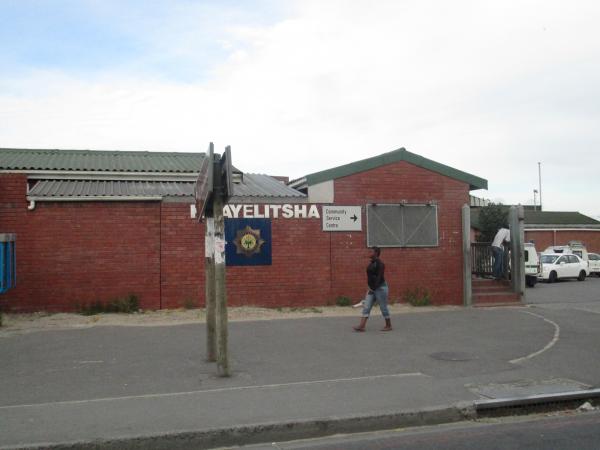

Khayelitsha police station. Photo by Nokubonga Yawa.
14 November 2012
The Commission of Inquiry into the allegations of police inefficiency in Khayelitsha is on hold pending the outcome of Minister of Police Nathi Mthethwa’s court action to stop the commission. But in his court papers Mthethwa has, perhaps unwittingly, included explosive documents which actually appear to strengthen the case for having a Commission of Inquiry.
There is a treasure trove of information that has entered the public domain via Mthethwa’s court papers. The media, including us, have only had time to analyse a small portion of it so far. Several media houses have run excellent articles, focusing particularly on a document titled Report on the Complaint Regarding Alleged Inefficiency and a Breakdown in Police-Community Relations in Khayelitsha, Cape Town, including City Press, the Cape Times, Mail & Guardian and the Daily Maverick. We will also run articles on GroundUp as we learn more.
Here is a summary of events until now:
In November 2011, several organisations led by the Social Justice Coalition (SJC), lodged a complaint against Khayelitsha’s police and criminal justice system. The organisations campaigned for Premier Helen Zille to establish a commission of inquiry.
On 22 August 2012 Premier Zille announced the establishment of a commission of inquiry (CoI) to investigate problems with policing by the South African Police Service (SAPS) in Khayelitsha. The civil society organisations welcomed this, but were upset that Zille did not include the Metro police in the Inquiry’s terms of reference. The premier appointed former Constitutional Court Judge, Catherine O’Regan, and former NPA Head, Advocate Vusi Pikoli, as commissioners. Many lawyers consider O’Regan the finest legal mind in the country.
On 29 October 2012, the O’Regan/Pikoli Commission conducted its first hearing, though this was confined to procedural matters. The first hearing of testimonies was supposed to take place on 12 November.
On 1 November, Minister Mthethwa filed papers with the Cape High Court asking for the Commission of Inquiry to be stopped.
On 12 November, the case was postponed until December. At the same time the SJC held a “People’s Commission of Inquiry” outside the Cape High Court. Several people who intended to give evidence to the Commission of Inquiry gave evidence of police incompetence.
During these events there was correspondence between Premier Zille, Minister Mthethwa and the Women’s Legal Resource Centre on behalf of the Social Justice Coalition. In a nutshell, Minister Mthethwa wanted Premier Zille to hold on the Commission of Inquiry and give the police an opportunity to investigate. This the police did. A task team was appointed led by a Major General Rapudi. In July 2012 the Task Team inspected the Khayelitsha police stations and interviewed members of the civil society organisations that complained. But the results of the task team’s investigation were never made public nor released to the civil society organisations until Minister Mthethwa filed court papers last week.
The task team’s report is damning. Consider its description of community-police relations:
Each of the three police stations in Khayelitsha has a community police forum. These are the structures tasked with keeping good relations between the community and the Khayelitsha police. The report explains how these forums are dysfunctional.
For one station, the report states that the “poor relationship between the management” of the police and the forum “is not conducive for effective co-operation and partnership policing.” For another station, the report states that it is not clear what the objectives off the weekly meetings of its forum are.
The forums are dominated by the, frankly shady, Khayelitsha Development Forum and so none of the complaining civil society can participate effectively in them.
And the police don’t seem that interested in the forums either: A seminar to look at safety was arranged by the forums on 7 July 2012, but the police did not attend.
The forum for the Lingelethu West Police station appears to function better than the forums of the other two police stations in Khayelitsha, but it is certainly not a shining example of success either. The sole contribution of the members of the forums to the task team investigation was to criticise the SJC and dispute the need for an inquiry.
The task team concluded that the “structures established by the Constitution to enhance police-community relations” are “not functioning effectively” nor “optimized in the Khayelitsha area.”
Compare this with a news article in the Cape Towner on 8 November about the City Bowl’s community policing forum. The article is titled, “Great year for community police forum”. The article describes the successes of the City Bowl’s community police forum. It stands in stark contrast to the task team’s report of the Khayelitsha community police forums. Yet, the former serves a comparatively low-crime safe area while the latter serves, according to the task team report, one of the most crime-ridden areas in the country.
After 20 odd pages of detail explaining numerous failures of Khayelitsha policing, which we will cover in future articles on GroundUp, the report concludes, in bureaucratic language, that there is a basis to the complaints they have received. However it says that it is unreasonable to claim there is a total breakdown in police-community relations.
Perhaps such a conclusion depends on one’s definition of “total breakdown”, which is surely subjective.
While the task team report is very useful, especially for the Commission of Inquiry, it does not negate the need for the O’Regan/Pikoli Commission of Inquiry. First, it is an investigation conducted by the police when what is needed is an inquiry conducted by people independent of the police. Second, as useful as it is, it is simply not good enough. It is a qualitative report. Many of its details are scanty (the report is only 20 odd pages) and much remains to be investigated.
Here are interesting articles on the Commission of Inquiry published in other media: